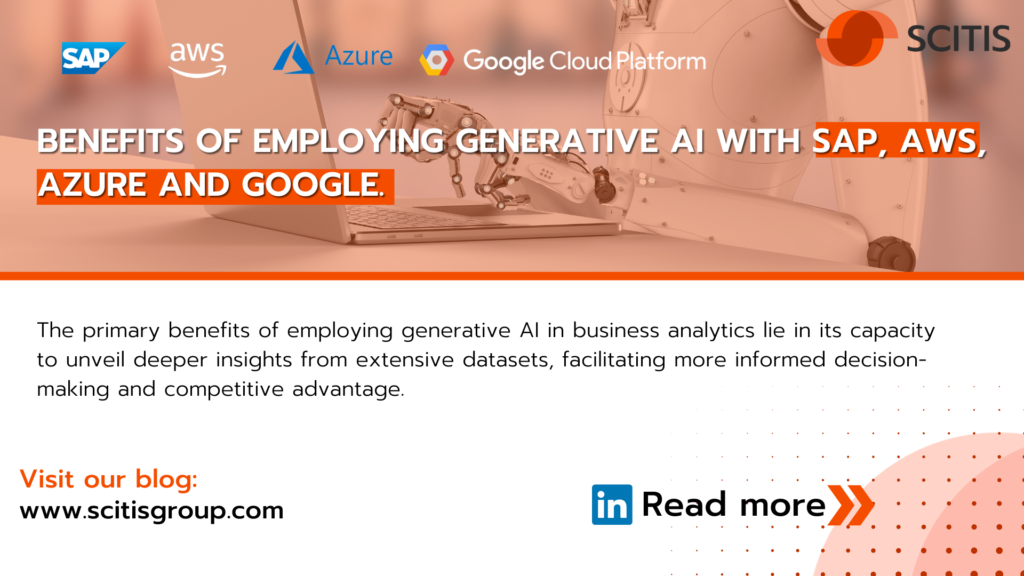The primary benefits of employing generative AI in business analytics lie in its capacity to unveil deeper insights from extensive datasets, facilitating more informed decision-making and competitive advantage. Furthermore, generative AI streamlines content creation processes by automating the generation of reports, summaries, and other materials, thus freeing up valuable time for analysts to concentrate on strategic tasks while maintaining a consistent output quality at scale. A couple of examples:
- Insight Generation: Generative AI can analyze customer purchase history, social media interactions, and demographic data to uncover patterns and trends. For instance, it may reveal that customers who purchase certain products also tend to engage with specific marketing campaigns on social media, allowing businesses to tailor their marketing strategies accordingly.
- Content Creation: Generative AI can automatically generate personalized product descriptions or marketing emails based on customer preferences and behavior. For example, it could create unique email campaigns for different customer segments, highlighting products or promotions that are most likely to resonate with each group, thereby increasing engagement and conversion rates.
Next, we will show you how this works in different platforms:
Generative AI with SAP
Generative AI is a type of artificial intelligence that creates text, images, and other content based on what it learns from data. At SAP, they use this tech alongside industry-specific data and deep process knowledge to add cool new AI features to our everyday apps. From helping write job descriptions and interview questions with SAP SuccessFactors Recruiting to making tasks easier with Joule, their AI buddy, they’re all about making things simpler and more productive. And with upcoming stuff like faster freight checks in SAP Transportation Management and automatic process models in SAP Signavio Process Transformation Suite, they’re always pushing the AI envelope. Plus, they’re big on trust and responsibility, making sure your AI tools are transparent, safe, and respectful of your data and privacy. So, you can tackle those tough business problems with confidence!
https://www.sap.com/products/artificial-intelligence/generative-ai.html
Generative AI with AWS
Amazon Bedrock is a fully managed service, presents a selection of cutting-edge foundation models (FMs) sourced from leading AI providers such as AI21 Labs, Anthropic, Cohere, Meta, Stability AI, and Amazon through a unified API, complemented by an extensive range of functionalities essential for constructing generative AI applications with emphasis on security, privacy, and ethical AI. Utilizing Amazon Bedrock facilitates effortless experimentation and assessment of premier FMs tailored to your
specific requirements, enabling confidential customization with proprietary data employing techniques such as fine-tuning and Retrieval Augmented Generation (RAG), while also enabling the creation of agents capable of executing tasks seamlessly within your enterprise ecosystem and data sources. Benefiting from its serverless nature, Amazon Bedrock eliminates the need for infrastructure management, ensuring hassle-free integration and deployment of generative AI capabilities into your applications leveraging familiar AWS services.
Amazon Bedrock can be instrumental in data analytics by enabling the development and deployment of advanced generative AI models tailored for specific analytical tasks.
https://aws.amazon.com/bedrock/
Generative AI with Azure OpenAI
In Azure analytical tools and Azure Machine Learning, Generative AI works by leveraging advanced algorithms and models to generate new data or content based on patterns learned from existing datasets. Within Azure Machine Learning, generative AI models can be trained and deployed to perform tasks such as image synthesis, text generation, or even creating new features for predictive modeling. In Azure analytical tools like Azure Synapse Analytics or Azure Data Factory, generative AI can be integrated into data pipelines to augment data processing tasks or generate synthetic data for testing and training purposes. Additionally, Azure Cognitive Services offers pre-trained models for text generation, image synthesis, and other generative tasks that can be easily integrated into Azure-based applications. Overall, Azure provides a comprehensive ecosystem for leveraging generative AI across various analytical and machine learning workflows, enabling organizations to unlock new insights and capabilities from their data.
https://azure.microsoft.com/en-us/products/ai-services/openai-service
Generative AI with Google
The best capabilities of Generative AI on Google Cloud include its ability to generate content based on training data, as well as its integration with other Google Cloud services for seamless deployment and scalability. One of the key benefits of Google’s Generative AI tool, Gemini, is its advanced natural language processing capabilities, which enable it to generate high-quality, contextually relevant text. Additionally, Gemini offers powerful image generation features, allowing users to create realistic images from textual descriptions. Moreover, Gemini leverages Google Cloud’s infrastructure for high-performance computing, ensuring fast and reliable processing of large datasets. Overall, the combination of advanced AI capabilities and robust infrastructure makes Gemini a valuable tool for a wide range of applications, from content generation to creative design.
https://cloud.google.com/ai/generative-ai

